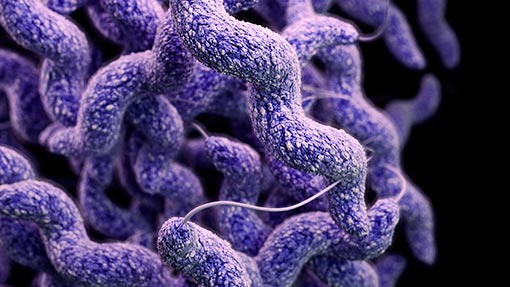Campylobacter found to damage health of poultry

A new study has claimed campylobacter is harmful to the health and welfare of modern strains of broiler, challenging the established idea that it is a commensal bacteria.
A team of researchers from the University of Liverpool experimentally infected four different breeds of broilers with a strain of campylobacter jejuni, and found bird type had a “major impact” on the response that the intestines mounted.
Four “meat-type” birds were selected; two slower-growing, more traditional strains, and two commercial broiler breeds.
The study found that, while breed had little impact on the level of colonisation within the gut, it had a major bearing on the immune response, and subsequently the health of the birds.
More modern breeds were found to develop a “prolonged inflammatory response” that led to damage to the mucosal cell wall in the gut and diarrhoea.
The researchers also pointed to a previous study that found high levels of pododermatitis and hock marks, themselves an indication of poor gut health, correlated with the levels of campylobacter found in the flock.
See also: Causes and solutions for campylobacter
Previously, campylobacter has been considered commensal – neither harmful nor helpful to the intestines and wellbeing of chickens. It is only once it spreads to humans that problems of food poisoning arise.
Researchers said one breed’s intestinal disease appeared to be a consequence of a “poorly regulated immune response”. But they added that it was “unclear” if changing breed type would have an impact on rates of human infection.
The report says: “In this work, we show that modern, rapidly growing chicken breeds used in intensive production systems have a strong inflammatory response to C jejuni infection that can lead to diarrhoea.
“These findings challenge the paradigm that C jejuni is a harmless commensal of chickens. C jejuni infection may have a substantial impact on animal health and welfare in intensive poultry production.”
